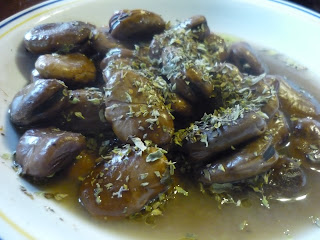If the northern cities are the brains and Rome is the brawn then Sicily must surely be Italy’s heart. We met up with an Australian who has taught English in Palermo for five years. The drawcard for her was the lack of English speakers. Good for her, as this meant more business. And good for her because she could immerse herself in a raw, undiluted culture. We notice very few toursists and it was peak season in our first week here. The holiday makers seemed to be other Italians and lots of them.
Timmy and I observed a few things many times over. And what we observed mostly concerned food and we were lucky enough to experience it at different levels of society here.
I would guess we ate out forty to fifty times. Sounds like a lot, huh? But think about it. We have been here for seventeen days. So eating out includes coffee and pastry in the morning, something light or otherwise for lunch and then a late dinner, at a restaurant or as guests in private homes.
People eat here and they eat a lot, with little or no deliberation. Eating, remember, is natural. I see none of the tortured relationship with food I encounter more and more in Australia. Certainly none of the disconnected or depersonalised relationship Americans have with food. Here, skinny girl or fat guy alike, if you are hungry, you eat. It is 11pm, you go out for dinner and you eat a pizza to yourself. You don’t share. It's all yours. Try suggesting to a Palermitan they shouldn’t eat carbies after six. It would be like a local saying to their mumma or nonna that they didn’t like their pasta sauce. Mumma mia! It simply wouldn’t happen.
Portions are not huge but dinner is often a multi course affair. The food is filling and there is little variety.
Timmy learnt that antipasto was not a traditional thing in Sicily and only became popular with the influx of tourists over the last ten or fifteen years. At a café, a trattoria (defined here by being less formal than a restaurant and not open at night) or at a restaurant, we noticed repetition.
Swordish croquettes (spade crochette) and sardine rolls are on just about every menu. As too is the traditional street sandwich, or muffaletto.
Pasta next. Lots of simple tomato based pasta sauces. Lots of fishy bits, sometimes sweetened with currants and salted with capers, anchovies or bottarga.
We are lucky enough to spend time eating with someone from one of Sicily’s oldest family run business and go to the their neo classical villa in Trapani. Natalia’s mother is preparing a traditional dinner for some Americans. The dessert is a home made grape jelly. Grated nutmeg is sprinkle over each one. This is in the air before we even get to the kitchen. The pasta is simple tomato and eggplant sauce.
At another dinner party hosted in a 18th century palazzo in the heart of old Palermo (so run down, in fact, that the piazza is as it was in 1945) we eat pasta with, yet again, a simple base of tomato and eggplant sauce.
Our cook, Franchy, prepares the eggplant. I generally do not salt eggplant before cooking but I noticed something here that has inspired me to do so from now on. Rather than sprinkling the eggplant with salt and leaving it to bleed, our host put the peeled and diced eggplant in a bowl of salted water for a few minutes. A much quicker and easier process. He drained it well and cooked it all off in a frying pan with lots of good olive oil. He then added some garlic, chopped, fresh tomatoes, basil and lots of salt and pepper. This was very easy and so tasty. Can’t wait to try this at home. Rich man, poor man. At a café where you pay 5 euro for a bowl of pasta, in a villa or a palace, there is a theme. Sicilians know what they like and they are proud to say it. You don’t even have to ask and they will tell you. They don’t do pretense. They don’t do fusion. It may seem repetitive but there is something re assuring and comforting about this. They love their food, simply and honestly and with a heart felt passion.



















